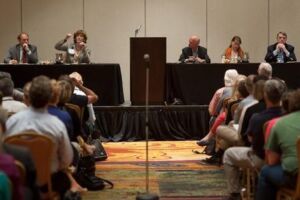Posts by hdcoadmin
SPECIAL REPORT: High incomes in public housing
Area housing authorities are supposed to be there to help low-income families that can barely get by: single parents, the elderly and people with disabilities, News Channel 11 reports. However after several public records requests, they found out the people who need the help the most are on lengthy waiting lists, while those who’ve conquered poverty…
Read MoreGambling triples its local reach in four months
By Brad Weisenstein, The Belleville News-Democrat The News-Democrat found the newly legal video gaming in Southwestern Illinois grew rapidly, with gamblers in April losing $1.06 million – nearly triple what they lost at the end of 2012. The growth of machines worries video gambling opponents and those who work with gambling addicts. Locally, the machines…
Read MoreSt. Clair County’s part-time employees earn the same benefits as those who work full time
By Daniel Kelley, The Belleville News Democrat A review of the salaries and benefits of public employees and elected officials at St. Clair County found the county spent more than $1 million on such benefits for 86 part-time employees and politicians. County officials say the benefits are necessary as an incentive to draw better employees…
Read More180 Arkansas facilities, mainly wholesale, retail, store fertilizer
By Ryan McGeeney, The Arkansas Democrat-Gazette Only one fertilizer manufacturer in Arkansas currently reports storing both anhydrous ammonia and ammonium nitrate, the two chemical compounds thought to be responsible for the fertilizer plant explosion in West, Texas, on April 17. Full story: http://www.emailthis.clickability.com/et/emailThis?clickMap=viewThis&etMailToID=899415213 This story was published with help from IRE’s Total Newsroom Training
Read MoreEnforcement Works To Keep Alcohol Violations In Check
By Misty Gittings, NWAonline Businesses selling alcoholic beverages in Benton and Washington counties had 72 violations from March 2012 through February, according to records from the state’s Alcoholic Beverage Control Division. Full story: http://www.nwaonline.com/news/2013/apr/21/enforcement-works-keep-alcohol-violations-check/ This story was published with help from IRE’s Total Newsroom Training
Read MoreGovernments battle to maintain bridges
By Ryan McGeeney, The Arkansas Democrat-Gazette When Washington County employees began tearing down the Miley Wagon Bridge near Baldwin earlier this year, there was no doubt about how the county was going to stay within its estimated $400,000 budget for the project: in-house manpower and resourceful purchasing. A quarter of the road bridges in Arkansas are…
Read MoreHow this year’s CAR Conference turned Australian journalist Edmund Tadros on to programming
Edmund Tadros, a journalist at The Australian Financial Review, said he used to dismiss the idea that journalists needed to know how to program. He considered it a waste of time. Even after he took some basic courses in web programming, and learned how to create interactive tables for his news organization’s site, he remained unconvinced.…
Read MoreDefense Department accounting errors leave some soldiers struggling to get by
A Reuters investigation has found that “pay errors in the military are widespread” and as many have found, including U.S. Army medic Shawn Aiken whose story Reuters has highlighted, “once mistakes are detected, getting them corrected – or just explained – can test even the most persistent soldiers.” “A review of individuals’ military pay records,…
Read MoreNew $34 million military headquarters in Afghanistan will sit unused
The U.S. military has erected a 64,000-square-foot headquarters in Afghanistan at a cost of $34 million, but has no plans to use it. Senior military officials told The Washington Post that they insisted they did not need the facility and see no point to moving into it as they withdraw forces from the area. Military…
Read MoreThe Obama administration’s war on leaks
// Leonard Downie Jr, far right, moderates the showcase panel entitled “The government’s war on leaks” with (l-r) Michael Oreskes of the Associated Press, Lucy Dalglish of the Phillip Merrill College of Journalism, author James Bamford and independent journalist Quinn Norton. Photo: Travis Hartman. The Obama administration’s war on leaks didn’t start with Edward Snowden.…
Read More Don't wait until the last minute! The
Don't wait until the last minute! The 
